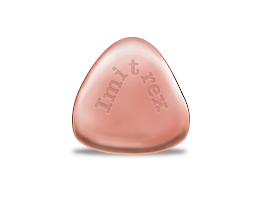
Imitrex, also known by its generic name sumatriptan, is a potent medication prescribed primarily for the treatment of migraines. It is particularly effective in reducing symptoms associated with migraines such as headache pain, nausea, and sensitivity to light and sound. The mechanism of action of Imitrex revolves around its ability to narrow the blood vessels around the brain. This is crucial because during a migraine attack, these blood vessels tend to dilate or expand, which contributes to the characteristic throbbing pain. By narrowing these vessels, Imitrex helps alleviate the pain associated with migraines.


| Package | Per pill | Total price | Save | Order |
|---|---|---|---|---|
| 100mg × 30 Pills | $6.39 | $191.58 + Bonus - 4 Pills | - | Add to cart |
| 100mg × 60 Pills | $6.04 | $362.11 + Bonus - 4 Pills Free Trackable Delivery | $21.00 | Add to cart |
| 100mg × 120 Pills | $5.86 | $703.16 + Bonus - 7 Pills Free Trackable Delivery | $63.60 | Add to cart |
| Package | Per pill | Total price | Save | Order |
|---|---|---|---|---|
| 50mg × 10 Pills | $8.66 | $86.64 + Bonus - 4 Pills | - | Add to cart |
| 50mg × 20 Pills | $6.77 | $135.47 + Bonus - 4 Pills | $37.80 | Add to cart |
| 50mg × 30 Pills | $6.14 | $184.31 + Bonus - 4 Pills | $75.60 | Add to cart |
| 50mg × 60 Pills | $5.51 | $330.81 + Bonus - 4 Pills Free Trackable Delivery | $189.00 | Add to cart |
| 50mg × 90 Pills | $5.30 | $477.31 + Bonus - 7 Pills Free Trackable Delivery | $302.40 | Add to cart |
| 50mg × 120 Pills | $5.20 | $623.81 + Bonus - 7 Pills Free Trackable Delivery | $415.20 | Add to cart |
| Package | Per pill | Total price | Save | Order |
|---|---|---|---|---|
| 25mg × 10 Pills | $6.98 | $69.83 + Bonus - 4 Pills | - | Add to cart |
| 25mg × 20 Pills | $5.46 | $109.18 + Bonus - 4 Pills | $30.40 | Add to cart |
| 25mg × 60 Pills | $4.44 | $266.60 + Bonus - 4 Pills Free Trackable Delivery | $152.40 | Add to cart |
| 25mg × 90 Pills | $4.27 | $384.67 + Bonus - 7 Pills Free Trackable Delivery | $243.90 | Add to cart |
| 25mg × 120 Pills | $4.19 | $502.74 + Bonus - 7 Pills Free Trackable Delivery | $334.80 | Add to cart |
Headaches: Types, Symptoms, and Treatments
Headaches refer to pain in the head or face, and they can manifest in various forms such as pressure, throbbing, a constant ache, or even sharp pain. The pain's intensity, location, and frequency can differ greatly from one person to another. Understanding the type of headache is crucial for effective management and treatment. This article will explore different types of headaches, their symptoms, and potential treatments.
Migraines:
Migraines are a common type of headache characterized by recurring moderate to severe head pain, often accompanied by nausea, vomiting, and sensitivity to light or sound. Some migraine sufferers experience an 'aura' before the onset of pain, which can include visual disturbances like flashing lights or blind spots. Migraines typically affect one side of the head and can last from hours to days. Treatment options range from over-the-counter (OTC) pain relievers and nonsteroidal anti-inflammatory drugs (NSAIDs) to prescription medications like triptans and ergotamine derivatives.
Tension Headaches:
Tension headaches are the most prevalent type of headache, often described as a constant, dull, aching pain on both sides of the head, with a feeling of tightness or pressure. Triggers may include stress, anxiety, lack of sleep, or poor posture. In most cases, tension headaches respond well to OTC pain relievers like acetaminophen or ibuprofen. For more frequent or severe tension headaches, preventive measures such as stress management techniques, regular exercise, and relaxation practices can help.
Cluster Headaches:
Cluster headaches are characterized by sudden, severe pain, usually concentrated around one eye or temple, often accompanied by symptoms like redness or watering of the affected eye and nasal congestion. As the name suggests, cluster headaches occur in clusters, with multiple attacks over a period of weeks or months, followed by a headache-free period lasting months or years. Treatment options include triptans, which can be administered through injections, nasal sprays, or tablets, as well as oxygen therapy and nerve block injections.
Sinus Headaches:
Sinus headaches result from inflammation and congestion of the sinuses, usually due to an infection or allergies. The pain is typically focused around the eyes, nose, and forehead and can be accompanied by a runny nose, fever, or facial swelling. Sinus headaches can be treated with OTC pain relievers, decongestants, and nasal corticosteroids. Antihistamines or allergy shots can also provide relief for allergy-induced sinus headaches.
Rebound Headaches:
Rebound headaches, also known as medication-overuse headaches, are caused by excessive use of pain-relieving medications for headaches. Although initially effective, the frequent use of OTC or prescription pain relievers can lead to headaches becoming more severe and frequent. Treatment typically involves a period of medication withdrawal, followed by the use of preventive strategies and alternative medications for acute headache relief.
In conclusion, understanding the various types of headaches and their specific symptoms and treatments is essential for effectively managing and preventing them. By consulting with a healthcare professional and employing the appropriate treatment strategies, individuals can achieve relief and improve their overall quality of life.
Headaches are a common health issue that can arise from a variety of causes. They can be broadly categorized into primary and secondary headaches.
Primary headaches occur independently and are not caused by another health condition. Some common triggers for primary headaches include dietary factors such as alcohol (especially red wine), certain foods (like cheese, citrus fruits, processed meats, and foods containing monosodium glutamate), large amounts of caffeine, skipping meals, and dehydration. Other triggers can be too much or too little sleep, poor posture, stress or relaxation after stress, excessive screen use, bright lights, loud noises, strong smells, sexual intercourse, and hormonal changes, particularly in females.
Secondary headaches are symptoms of another health problem. They can be caused by various factors such as acute or chronic sinus infections, eye strain, dental problems, middle ear infections, side effects of certain medications, and dehydration. However, secondary headaches can also be a sign of more serious health conditions, including aneurysms, high blood pressure, glaucoma, brain tumors, head injuries, meningitis, and stroke.
It's important to note that the causes and symptoms of headaches can vary widely from person to person, and different types of headaches (like tension headaches, migraines, cluster headaches, etc.) may have different triggers. Severe or persistent headaches should be evaluated by a healthcare professional.






